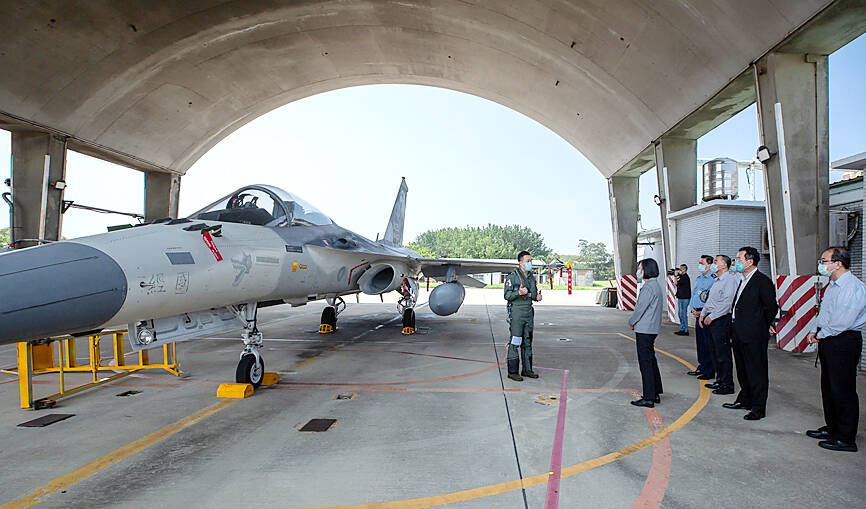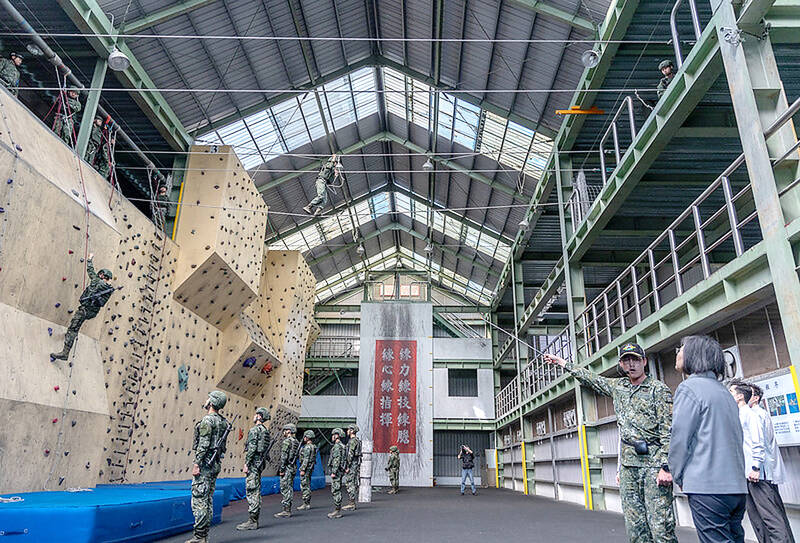The US is to sell Taiwan four sets of Norwegian Advanced Surface-to-Air Missile Systems (NASAMS), which can be integrated with systems Taiwan already uses, including the domestically developed Tien Chien II (Sky Sword) missile system, a source said yesterday.
The NASAMS can also be integrated with the US-made Avenger vehicle-launched air-defense missile system, which Taiwan also uses, through the use of a Link 16 military data link, the source said.
The NASAMS would be used to defend key areas, including military airports and government sites in Taipei, the source said.

Photo courtesy of the Presidential Office
Whether Taiwan would acquire the NASAMS through the US$2 billion in direct loans for military purposes stipulated in the Omnibus Consolidated Appropriations Act signed by US President Joe Biden last year, or the US$10 billion of grants over five years stipulated in the US’ National Defense Authorization Act for Fiscal Year 2023, remained unclear, the source said.
However, the NASAMS are expected to be delivered next year, they said.
“NASAMS combines the MPQ-64 Sentinel radar, compatibility with multiple types of short and medium-range air defense missiles, and the Link 16 military tactical data link network used by NATO,” the source said. “It is a powerful ground-to-air defense system that can defend against aircraft up to 50km away.”

Photo courtesy of the Presidential Office
Missiles compatible with NASAMS include the AIM-120 Advanced Medium-Range Air-to-Air Missile (AMRAAM), the AMRAAM Extended Range missile, the short-range AIM-9X Block II Sidewinder missile and the German-made IRIS-T short-range anti-aircraft missile, among others, the source said.
“The flexibility to use Sidewinders is a key advantage of the NASAMS, as we have seen in Ukraine. When a runway is damaged and planes cannot take off, the Sidewinders can be taken off the planes and loaded into the NASAMS,” the source said.
The acquisition of NASAMS, a laser-based drone defense system produced in the US and Norway, the AGM-158C Long Range Anti-Ship Missile and other types of precision ammunition promised to Taiwan by the US would greatly bolster Taiwan’s defensive capabilities, Institute of National Defense and Security Research fellow Su Tzu-yun (蘇紫雲) previously said in an interview.
Separately yesterday, President Tsai Ing-wen (蔡英文) thanked fighter jet pilots who scrambled against China’s air force during its drills around Taiwan proper and pledged to further bolster the armed forces.
China began the exercises, including simulated precision strikes with bombers and missiles, on Saturday last week, after Tsai returned from Los Angeles, where she met US House of Representatives Speaker Kevin McCarthy.
During a meeting in Taichung with pilots who are frequently stationed at a frontline air base in Penghu County’s Magong City (馬公), Tsai thanked them for their hard work and for sticking to their posts at all times.
“I want to tell everyone: As long as we are united, we can reassure the country’s people and let the world see our determination to protect the nation,” she said in a video clip provided by the Presidential Office.
Tsai added that the Taiwan-made Ching-kuo Indigenous Defense Fighters (IDF), which entered service in 1997, had been upgraded to more advanced versions.
“In the future, we will continue to upgrade software and hardware facilities, and improve personnel training,” she said.
Tsai’s office showed images of her talking to pilots dressed in flight uniforms and being given a briefing in front of an IDF parked in a hangar.
China’s three-day drills formally ended on Monday, but Taiwan has reported continued Chinese activity, although on a reduced scale.
Yesterday morning, the Ministry of National Defense said it had not spotted any Chinese military aircraft crossing the median line of the Taiwan Strait in 24 hours.
In its regular morning report on Chinese military activities, the ministry said it had detected four Chinese military aircraft and eight Chinese warships around Taiwan.

NATIONAL SECURITY THREAT: An official said that Guan Guan’s comments had gone beyond the threshold of free speech, as she advocated for the destruction of the ROC China-born media influencer Guan Guan’s (關關) residency permit has been revoked for repeatedly posting pro-China content that threatens national security, the National Immigration Agency said yesterday. Guan Guan has said many controversial things in her videos posted to Douyin (抖音), including “the red flag will soon be painted all over Taiwan” and “Taiwan is an inseparable part of China,” while expressing hope for expedited “reunification.” The agency received multiple reports alleging that Guan Guan had advocated for armed reunification last year. After investigating, the agency last month issued a notice requiring her to appear and account for her actions. Guan Guan appeared as required,

A strong cold air mass is expected to arrive tonight, bringing a change in weather and a drop in temperature, the Central Weather Administration (CWA) said. The coldest time would be early on Thursday morning, with temperatures in some areas dipping as low as 8°C, it said. Daytime highs yesterday were 22°C to 24°C in northern and eastern Taiwan, and about 25°C to 28°C in the central and southern regions, it said. However, nighttime lows would dip to about 15°C to 16°C in central and northern Taiwan as well as the northeast, and 17°C to 19°C elsewhere, it said. Tropical Storm Nokaen, currently

‘NATO-PLUS’: ‘Our strategic partners in the Indo-Pacific are facing increasing aggression by the Chinese Communist Party,’ US Representative Rob Wittman said The US House of Representatives on Monday released its version of the Consolidated Appropriations Act, which includes US$1.15 billion to support security cooperation with Taiwan. The omnibus act, covering US$1.2 trillion of spending, allocates US$1 billion for the Taiwan Security Cooperation Initiative, as well as US$150 million for the replacement of defense articles and reimbursement of defense services provided to Taiwan. The fund allocations were based on the US National Defense Authorization Act for fiscal 2026 that was passed by the US Congress last month and authorized up to US$1 billion to the US Defense Security Cooperation Agency in support of the

PAPERS, PLEASE: The gang exploited the high value of the passports, selling them at inflated prices to Chinese buyers, who would treat them as ‘invisibility cloaks’ The Yilan District Court has handed four members of a syndicate prison terms ranging from one year and two months to two years and two months for their involvement in a scheme to purchase Taiwanese passports and resell them abroad at a massive markup. A Chinese human smuggling syndicate purchased Taiwanese passports through local criminal networks, exploiting the passports’ visa-free travel privileges to turn a profit of more than 20 times the original price, the court said. Such criminal organizations enable people to impersonate Taiwanese when entering and exiting Taiwan and other countries, undermining social order and the credibility of the nation’s